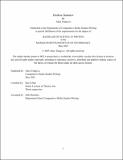Daikon Summer
Author(s)
Le, Alice Trang
DownloadThesis PDF (1.890Mb)
Advisor
Urban, Ken
Terms of use
Metadata
Show full item recordAbstract
In Vietnamese, there’s a phrase “ôm sầu riêng” which means “holding onto your sadness on your own.” But if you read it literally, it means “holding durian.”
When Juliette, a heartbroken college student, visits locations from her favorite film hoping to find a movie-magical romance, she unknowingly crosses paths with Hana, the film’s jaded screenwriter, who is struggling to come up with ideas for a new script after the end of a long-term relationship. After splitting from their partners, Juliette and Hana emotionally isolate themselves from others to erase the reminder of the connections they’ve lost. Juliette brings a daikon radish (no durians were for sale) around with her for company—rolling it around in a little red wagon—hoping to meet-cute with strangers at each movie location she visits. Meanwhile, Hana trades her normal routine for destructive habits to cope with the new absence surrounding her. However, unbeknownst to Juliette and Hana, while pursuing their own solitudes, they are together in their loneliness. As time passes, marked by missed connections and the daikon radishes that Juliette must replace, and by the new situations Hana gets herself into while searching for inspiration for her next film, the pair find they may have stumbled onto an unexpected path to getting closure that brings them towards one another.
Part romance, part drama, part comedy, Daikon Summer is a coming of age story about learning how to be alone. It’s a film that sits with the unfinished, unresolved, and incomplete. The setting of the film—the fictional city of Berlin, California—feels at the same time as stagnant and painfully mundane as the characters’ internal worlds and as absurdly rose-colored as their dreams. In a summer heavy with a suffocating atmosphere of longing and existential ennui, the characters, at first too scared to be alone they can’t even let go of their sadness, learn to hold onto something else—the security of their own company and their growing conviction that they’ll run into something or someone exciting around the next corner. A story about finding one’s hope and romanticism again, Daikon Summer is both a love letter to cinema, to the tender ways stories can connect us to one another, and a meditation on the self in love.
Date issued
2025-05Department
Massachusetts Institute of Technology. Program in Comparative Media Studies/Writing; Massachusetts Institute of Technology. Graduate Program in Science WritingPublisher
Massachusetts Institute of Technology